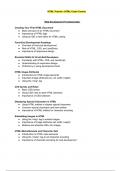Summary
Summary - Web Development
- Course
- Institution
This document is a comprehensive guide to learning HTML, covering fundamental concepts such as HTML structure, tags, attributes, and elements, as well as advanced topics like semantic HTML, forms, tables, responsive design, and accessibility. It is designed for beginners and aspiring web developers...
[Show more]



